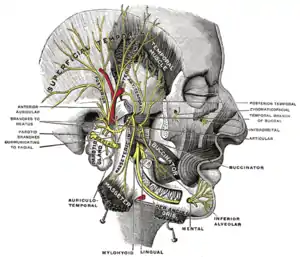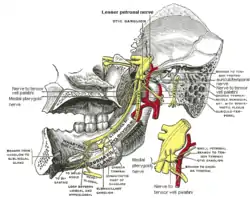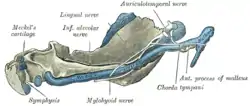Mylohyoid nerve
The mylohyoid nerve (or nerve to mylohyoid) is a mixed nerve of the head. It is a branch of the inferior alveolar nerve. It provides motor innervation the mylohyoid muscle, and the anterior belly of the digastric muscle. It provides sensory innervation to part of the submental area, and sometimes also the mandibular (lower) molar teeth, requiring local anaesthesia for some oral procedures.
| Mylohyoid nerve | |
|---|---|
 Mandibular division of the trigeminal nerve. (Label for mylohyoid nerve is at bottom center.) | |
 Mandibular division of trifacial nerve, seen from the middle line. The small figure is an enlarged view of the otic ganglion. (Label "to mylohyoid" at bottom left.) | |
| Details | |
| From | inferior alveolar nerve |
| Innervates | mylohyoid muscle, anterior belly of digastric muscle |
| Identifiers | |
| Latin | nervus mylohyoideus |
| TA98 | A14.2.01.090 |
| TA2 | 6275 |
| FMA | 53247 |
| Anatomical terms of neuroanatomy | |
Structure
Origin
The mylohyoid nerve is a mixed (motor-sensory)[1] branch of the inferior alveolar nerve (which is a branch of the mandibular nerve (CN V3) that is itself a branch of the trigeminal nerve (CN V)).[2][1] It arises just before it enters the mandibular foramen.[1]
Course
It pierces the sphenomandibular ligament.[3] It descends in a groove on the deep surface of the ramus of the mandible. When it reaches the under surface of the mylohyoid muscle, it gives branches to the mylohyoid muscle and the anterior belly of the digastric muscle.[1]
Motor
The mylohyoid nerve supplies the mylohyoid muscle and the anterior belly of the digastric muscle.[2][1]
Sensory
It provides sensory innervation to the skin of the centre of the submental area.[4] It may also provide some sensory innervation to the mandibular (lower) molar teeth.[5]
Clinical significance
The mylohyoid nerve needs to be blocked during local anaesthesia of the mandibular (lower) teeth to prevent pain during oral procedures.[5][6] It may not be anaesthetised during a block of the inferior alveolar nerve, causing pain.[1]
Additional images
 Mandible of human embryo 24 mm. long. Outer aspect.
Mandible of human embryo 24 mm. long. Outer aspect. Mandible of human embryo 95 mm. long. Inner aspect. Nuclei of cartilage stippled.
Mandible of human embryo 95 mm. long. Inner aspect. Nuclei of cartilage stippled. Infratemporal fossa. Lingual and inferior alveolar nerve. Deep dissection. Anterolateral view
Infratemporal fossa. Lingual and inferior alveolar nerve. Deep dissection. Anterolateral view
References
![]() This article incorporates text in the public domain from page 896 of the 20th edition of Gray's Anatomy (1918)
This article incorporates text in the public domain from page 896 of the 20th edition of Gray's Anatomy (1918)
- Bennett, Sam; Townsend, Grant (2001). "Distribution Of The Mylohyoid Nerve: Anatomical Variability And Clinical Implications". Australian Endodontic Journal. 27 (3): 109–111. doi:10.1111/j.1747-4477.2001.tb00470.x. ISSN 1747-4477. PMID 12360663.
- Hallinan, James T. P. D.; Sia, David S. Y.; Yong, Clement; Chong, Vincent (2018). "Chapter 3 - The Sphenoid Bone". Skull Base Imaging. Elsevier. pp. 39–64. doi:10.1016/B978-0-323-48563-0.00003-9. ISBN 978-0-323-48563-0.
- Sinnatamby, Chummy S. (2011). Last's Anatomy (12th ed.). p. 364. ISBN 978-0-7295-3752-0.
- Iwanaga, Joe; Ibaragi, Soichiro; Okui, Tatsuo; Divi, Vasu; Ohyama, Yoshio; Watanabe, Koichi; Kusukawa, Jingo; Tubbs, R. Shane (2022-08-01). "Cutaneous branch of the nerve to the mylohyoid muscle: Potential cause of postoperative sensory alteration in the submental area". Annals of Anatomy - Anatomischer Anzeiger. 243: 151934. doi:10.1016/j.aanat.2022.151934. ISSN 0940-9602. PMID 35307555. S2CID 247543350.
- Ferneini, Elie M.; Bennett, Jeffrey D. (2016). "32 - Anesthetic Considerations in Head, Neck, and Orofacial Infections". Head, Neck, and Orofacial Infections - A Multidisciplinary Approach. Elsevier Science. pp. 422–437. doi:10.1016/B978-0-323-28945-0.00032-6. ISBN 978-0-323-28945-0.
- Gulabivala, K.; Ng, Y.-L. (2014). "10 - Management of acute emergencies and traumatic dental injuries". Endodontics (4th ed.). Mosby. pp. 264–284. doi:10.1016/B978-0-7020-3155-7.00010-2. ISBN 978-0-7020-3155-7.
External links
- Anatomy photo:27:09-0102 at the SUNY Downstate Medical Center - "Infratemporal Fossa: The Inferior Alveolar Nerve and the Vessels"
- MedEd at Loyola GrossAnatomy/h_n/cn/cn1/cnb3.htm
- lesson4 at The Anatomy Lesson by Wesley Norman (Georgetown University) (mandibularnerve)
- cranialnerves at The Anatomy Lesson by Wesley Norman (Georgetown University) (V)